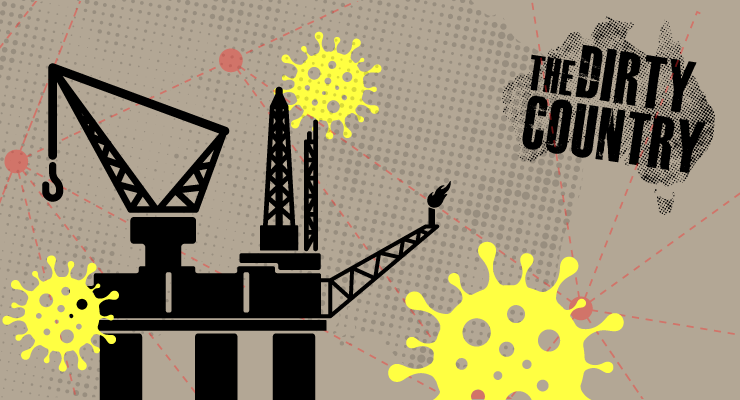
This is day five of The Dirty Country: Corruption in Australia. Read the whole series here.
Last year, as Australia was readying itself for the COVID-19 pandemic, Prime Minister Scott Morrison put in a call to his friend, former Fortescue mining boss Nev Power.
Morrison wanted Power to chair an advisory group that would help steer the country through the worst of the impending crisis.
“I simply said: ‘Nev, I need you to serve your country,’ ” Morrison said.
The National COVID-19 Commission Advisory Board (NCC) was supposed to be our saviour — a hive mind of expertise to help guide the government through one of its biggest health and economic challenges. Instead it became a symbol of everything wrong with Australian politics: powerful vested interests, a revolving door, jobs for mates and a profound lack of transparency.
The NCC is a powerful example of how power works in Australia — and how conflicts of interest have flourished under COVID. It’s one reason why Crikey has dedicated a reporter to examine the role they are having on our democracy.
As a conflicts of interest reporter, a big part of my job has been to pick apart some of the conflicts inside Morrison’s very corporate COVID commission.
Take Andrew Liveris, the Darwin-born billionaire turned Trump adviser, who landed on the commission in a “special adviser” role alongside Power. Liveris has a CV littered with potential conflicts, including his role on the board of Saudi Aramco and mining company Worley Energy — a potential beneficiary of the commission’s proposed “gas-led recovery”.
Yet there was no requirement for him to disclose any of them publicly. Power is also deputy chairman of gas company Strike Energy, but he has stepped away from the board during his time at the NCC.
Grattan Institute researcher Kate Griffiths says the commission has been one of the most alarming things to emerge from the crisis from a governance and accountability perspective.
“It’s a concern because it comes under the banner of ‘cabinet in confidence’,” she said.
“We don’t know how the appointments process ran. We don’t know why they’ve made the decisions they’ve made. But it looks suspicious when you’ve got individuals that have interests in the energy industry, for example, driving policies that align with that.”
Adam Lucas, a senior lecturer at the University of Wollongong, says conflicts of interest have been allowed to flourish because of the extent of “game of mates” politics in Australia, in which the government is captured by a revolving door of ministers-turned-lobbyists.
“It’s rampant and shameless,” he said. “And it’s not just in the fossil fuel and mining sector but across the board.”
Crikey has reported on conflicts of interest all across the country, from Perth to Brisbane. In the west we covered Seven’s support of its own network’s Basil Zempilas in his run for lord mayor in Perth. In Queensland we asked which corporate interests would benefit from a Queensland Labor victory. And in NSW we looked at the approval of the Narrabri gas project to a company with a remarkable knack for getting what it wants.
So why are these conflicts of interest so prolific and endemic to Australian life?
Fully one-third of registered lobbyists on the federal register had been involved in some way in politics or the bureaucracy — either staffers or former public servants, ADF personnel, ministers or MPs.
Lucas’ analysis of job-swapping between public servants and fossil-fuel lobbyists between 2007 and 2017 revealed 107 former or current political advisers held advisory or fiduciary roles with resources interests.
Two key examples were the networks spawned by moves into the resources sector by former resource ministers Martin Ferguson and Ian Macfarlane. Ferguson became chair of an advisory board for Australia’s oil and gas peak body, APPEA, shortly after leaving politics, and Macfarlane was appointed chief executive of the Queensland Resources Council four months after leaving federal politics.
But the problem is much bigger than one sector. Former defence minister Christopher Pyne has come under scrutiny for his growing client list of defence contractors. His two lobbying firms represent companies that won millions in government contracts while he was a minister, and prompted a formal warning from the attorney-general.
Conflicts have also been on display inside the Queensland Labor government. Premier Annastacia Palaszczuk’s former political adviser Cameron Milner was a key adviser to the government during the state election in October at the same time as he was working as a lobbyist for industry.
Although conflicts of interest are rampant, there are solutions.
The Grattan Institute, which revealed the extent to which Australian politics is captured by well-resourced interests in its detailed report “Who’s in the room?“, argues there are simple reforms that would shed light into the darkest corners of Australian politics.
The first is to establish an federal anti-corruption commission — one with stronger powers and far greater reach than that proposed by the Morrison government (which would actually protect those accused of corruption).
Next would be to publish ministerial diaries to allow the public to see exactly who ministers are meeting with and encourage them to seek a wider range of views.
It then recommends strengthening the lobbyist register and ensuring lobbyists adhere to the industry code of conduct.
Finally it recommends increasing transparency around political donations by having more timely data and lowering the cap to $5000.








Crikey is committed to hosting lively discussions. Help us keep the conversation useful, interesting and welcoming. We aim to publish comments quickly in the interest of promoting robust conversation, but we’re a small team and we deploy filters to protect against legal risk. Occasionally your comment may be held up while we review, but we’re working as fast as we can to keep the conversation rolling.
The Crikey comment section is members-only content. Please subscribe to leave a comment.
The Crikey comment section is members-only content. Please login to leave a comment.